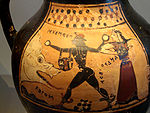- Cetus (mythology)
-
Greek deities
seriesPrimordial deities Titans and Olympians Chthonic deities Personified concepts Other deities Aquatic deities In ancient Greek, the word ketos (Ancient Greek: Κῆτος, Kētos, plural cetea Ancient Greek: κήτεα) - Latinized as cetus - denotes a large fish, a whale, a shark, or a sea monster.[1] The sea monsters slain by Perseus and Heracles were each referred to as a cetus by ancient sources.[2] The term cetacean originates from cetus. In Greek art, cetea were depicted as serpentine fish. The name of the mythological figure Ceto is derived from ketos. The name of the constellation Cetus also derives from this word.
Contents
In the Bible
In Jonah 2:1 (1:17 in English translation), the Hebrew text reads dag gadol (דג גדול), which literally means "great fish." The Septuagint translates this phrase into Greek as mega ketos (μέγα κῆτος). The term ketos alone means "huge fish," and in Greek mythology the term was closely associated with sea monsters. Jerome later translated this phrase as piscis grandis in his Latin Vulgate. However, he translated the Greek word kētos as cetus in Gospel of Matthew 12:40.
Ships and Sailing
Cetus has often been used as a ship's name or maidenhead denoting either a ship unafraid of the sea or a ruthless pirate ship to be feared. Cetus (and its translations) are also viewed as misfortune or bad omen by sailors. Superstitious sailors believed in a cetus as the bringer of a great storm or misfortune to the ship, that is lost cargo, pirates or being swept off course, and avoided any talk of it aboard ship.
Notes
External links
Categories:- Greek legendary creatures
- Mythical aquatic creatures
- Dragons
- Greek sea gods
Wikimedia Foundation. 2010.

